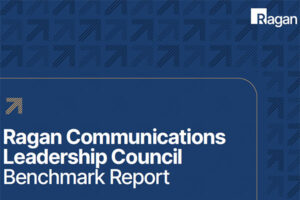Leveraging laughter: Making your communications stand out with humor
Humor tips from a presidential speechwriter.

Adam Kiefaber is an experienced communicator, who has led PR teams for Fortune 500 companies in payments and financial services. Previously, he spent nearly 10 years as a journalist working for The Cincinnati Enquirer, The Cincinnati Post and CNN.
In today’s changing corporate culture, the leaders we support have a communication problem.
After the last few years of uncertainty – talk of recession, return to the office, or ramifications when speaking out about societal issues – our CEOs and leaders are having trouble finding the right words.
Maybe a joke can help!
Sounds silly, I know, but what if I told you that a bit of humor might be the right medicine to make your leader more trustworthy, credible and likeable.
To tell this story – and add a bit of credibility to this article – I recently interviewed speechwriter and creative collaborator Mark Katz. You may not know him, but he has helped executives deliver punchlines for decades. His past clientele even includes a United States president who appreciated the proper use of a joke, William Jefferson Clinton.
Using humor to claim credibility
Let’s go back to 1993, when Katz was tasked with writing a humorous speech for the newly elected President Bill Clinton for the White House Correspondents Association dinner.
For context, things were not going well for Clinton in the first 100 days of his presidency. Leading up to the event, White House Press Secretary Dee Dee Myers worked hard to deny any shortcomings of her boss.
However, the night of the event, the president took the stage and said:
“I don’t think I’m doing that bad. By the time of his first 100 Days in office, William Henry Harrison had already been dead for 68 days!”
Katz said that, “conceding the obvious gives up nothing but gives back credibility. The trick is to figure out what your worst enemy might say about you and figure out a way to say it about yourself.”
How humor can make you likable and respected
Fast forward to 2006.
While reading the New York Times one morning, Katz saw the front-page news that Tom Freston, CEO at Viacom, had been fired for not leading the company to its digital future fast enough after a rival media company acquired Myspace. Freston was known for being highly successful and responsible for operating and launching networks like MTV, Nickelodeon, and Comedy Central, to name a few.
Katz knew that Freston was scheduled to give a keynote at a high-profile media executive luncheon in less than two months.
“Even though I had never met Tom Freston, I was quite certain he would soon be trying to get out from giving the speech. Ten minutes later, I overhead myself thinking about the daring speech he ought to give. And an hour after that, I had filled up a few pages of notes with what would later become a first draft,” Katz said.
Katz had a client who knew Freston and asked to be connected. The idea of the speech was for Freston to humorously share that in the weeks since he had been fired, he had discovered something called the internet and was excited to tell his fellow media moguls all about it.
“First thing I did after I got canned was, I went out and bought myself a computer,” Freston comedically told the audience. “Just never got around to it before now. I always said, “Hey, I work in global media – what the hell do I need a computer for?”
By the end of the speech, Freston controlled the room and the narrative. The New York Times reported favorably on his remarks. It was one of the highlights of Katz’s career, and by not pulling out of the keynote, Katz said, “we showed that Tom Freston was the real deal.”
By the way — for the history buffs — Myspace was acquired by Rupert Murdoch’s News Corp for $580M in 2006. Six years later, News Corp sold it off for $35M.
Using humor – instead of spin – to solve problems
During our interview, Katz continued to emphasize that humor is a tool that can solve problems.
Take the Clinton example. Instead of denying that the first 100 days were tough, what if the press secretary had used the same joke as the president, and then continued with ‘but let me tell you what we have accomplished …’
“Humor flatters where spin insults,” Katz said. “Spin is: ‘I think you are just dumb enough to believe this.’ Humor is: ‘I think you are smart enough to understand this difficult thing I am trying to say.’
“By telling that joke, the press secretary would have established credibility and what she said next would have resonated with truth.”
Fast forward to today: take all those recent uncomfortable corporate conversations we have heard about the recession, return to work or not speaking out. What if our leaders established credibility by simply acknowledging how they and their audience felt about it – maybe admitting and joking how everything hasn’t gone to plan?
The result would likely have brought more alignment with their audience.
“Humor is a very contextual form of communication that allows the audience to unlock the meaning of a message. It is up to the speaker to decide what that message is. But to the trained ear, laughter is the sound of a consensus being reached,” Katz said.
“The critical question for any communicator is this: How do you want to spend that hard-earned credibility to help solve the problem at hand?”
Learn more about making speeches that sing at Ragan’s Public Affairs & Speechwriting Virtual Conference on Wednesday, February 21, 2024 11 a.m.-3:30 p.m. ET.






